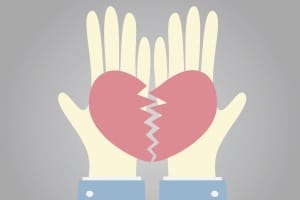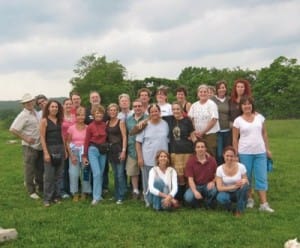“My name is Edie and I’m co-dependent.” These are the words I spoke in CODA meetings for six years, from 1992 to 1998. Unlike many who sat in the rooms, I am not the child of alcoholics or addicts. My parents created a nurturing environment in our home, with a loving and intact marriage for nearly 52 years when my father died in 2008. My mother joined him in 2010. There was no abuse, nary a harsh word spoken between any of us. They provided food, shelter, clothing, toys, books and vacations. Both of them worked outside the home and volunteered in the community. We were an affectionate bunch, with plenty of aunts, uncles, cousins and, in the early years of my life, both grandmothers, showering my sister and me with attention.
The Early Roots of Co-Dependence
When a former co-worker asked me the question, “How did you get like this?” I was puzzled. “Get like what,” I volleyed back. “So co-dependent.” I rolled back the clock and recalled that even as my folks were role models for resilience in the face of the early deaths of their fathers and mothers, there was little room (at least in my child’s mind) for taking much time to grieve. As much as I know that my mother missed my grandmother who died when I was 4, throughout the rest of her own life, she kept on keeping on, not missing a beat in taking care of us. The verbal messages I received from them included:
- “If you can’t say something nice, don’t say anything at all.”
- “What hurts you hurts me.”
- “Don’t let them (boyfriends who initiated breakups) see you cry, since they will know you are vulnerable and take advantage of that.”
- “Walk in like you own the joint.”
- “They put their pants on one leg at a time, just like you do.”
- “Your life is in the hands of anyone who makes you lose your temper.”
- “If that’s the worst thing that ever happens to you, you’ll be ok.”
Some of these would be considered overwhelmingly positive, while others bear with them the seeds for my chameleon-like persona. One that I toted around with me and used as a litmus test for my actions was, “Don’t do anything we would be ashamed of.” It wasn’t until I sat with my mother near the end of her hospice journey and I raised the topic that she corrected my perception, “We never said not to do anything we would be ashamed of. We told you not to do anything YOU would be ashamed of.” An imprint that I carry into my mid-50s is the curly haired darling that I call “Little Shirley Temple, tap dancing for attention.” I never felt like I needed to earn applause. I spent decades figuring out how to maintain it. It took the form of being ‘the good girl, A student, Type A workaholic caregiver who practiced what I refer to as “savior behavior.” I thought I needed to heal, save, fix, cure and kiss all of the boo-boos to make them better and secure my place in people’s lives and hearts.
A Perfect Partner for My Co-Depend-Dance
In over 30 years as a clinician, I have come to view co-dependence as permeable or non-existent boundaries, not knowing where you leave off and another person begins, and people-pleasing as a means of securing love, attention and emotional sustenance. It is a means of controlling interactions, since many reason, “Who wouldn’t love someone who meets their needs, protects them from their choices and ameliorates the impact of their behaviors?” In 1986, I met a man who would become my husband the following year. The perfect partner with whom to do my co-depen-dance, in many ways, Michael’s family was polar opposite of mine. Growing up in a home with an alcoholic/rage-aholic father and a mother who had bouts of depression, he absorbed messages that he wasn’t enough and needed to earn love and approval. When we came together, he presented well; charming, articulate, demonstrably loving; professing adoration and there was this undercurrent of sadness that immediately sent my savior behavior into high gear. Throughout our nearly 12-year marriage that ended when he died in 1998, we rode waves of tumult and tenderness, chaos and caring. Our family patterns dovetailed and it wasn’t always pretty. He would point out that in the throes of my addiction (and I do consider co-dependence a behavioral addiction or process addiction), I was “an emotional contortionist who would bend over backward to please people,” “a deer caught in the headlights when it came to decision-making,” and that I would “be looking over my shoulder to see if the ‘propriety police’ were watching.” Apt descriptions all. My friend, purveyor of song parodies who I consider a Spiritual Weird Al Yankovich, named Scott Kalechstein Grace wrote a little ditty called “Just a Co-dependent Love Song.” It is sung to the tune of the Three Dog Night song “Just an Old Fashioned Love Song” with the chorus: “Just a co-dependent love song, one that’s filled with pain and misery. Just a co-dependent love song, glorifying insecurity.” He then goes on to share the tunes “I Can’t Smile Without You,” “You Made Me Love You, I Didn’t Want To Do It” and “I Know I’ll Never Love This Way Again.” We can laugh at them or take them as relationship guidance. I don’t know about you, but I much prefer the former. Inviting inner exploration, I ask you to consider these questions: How would you define co-dependence? What did you learn about boundaries throughout your life? What messages did you receive about relationships? What did you learn about saying yes and no? What did you learn about caregiving? Is there a history of abuse or addiction in your family of origin? By being aware of these dynamics in your own life, you may be able to avoid the less-than-graceful moves when you step out onto the dance floor with the next partner who holds out his or her hand.


